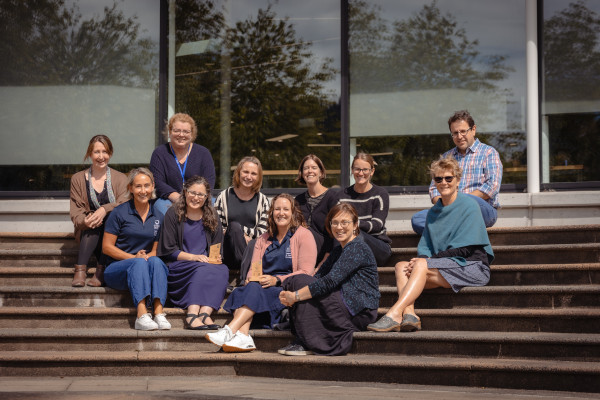- Tūhono home Hoki ki Tūhono
-
- Staff Directory
- Chief Executive Office Auckland International Office Corporate Services Finance Campus Services Functions and Catering Information Systems and Support Marketing, Communications and Engagement Learner Journey Academic Registry International Learner Services Te Punaka Ōwheo
- Learner Experience Academic Excellence Central Campus College of Community Development and Personal Wellbeing College of Engineering, Construction and Living Sciences College of Health College of Work Based Learning Open Education Resource/OERu Research and Postgraduate Studies Te Maru Pumanawa | College of Creative Practice and Enterprise
- Māori Development and Kaitohutohu Office People, Culture & Safety People and Culture Childcare Centre Te Ama Ako | Learning and Teaching Development Wellbeing and Safety Auckland Staff Directory Executive Office Academic Corporate Services Marketing and Business Development Human Resources Campus Quality and Programme Development
-
 Our people make a better world
Our people make a better world
We build the capabilities of individuals, organisations and communities and help them to realise their potential.
Staff Directory
-
- Tools
- Academic Integrity Declaration Form AIC applications dashboard Approved programmes Approved programme fees Centralised assessement repository Chemwatch Course evaluation and surveys CRM applications CRM customer service hub Delegations policy/process Disability and neurodiversity Dynamics 365 (CRM) EBS Ontrack EBS Report Email security personal portal Employment Matters / Solarworkplace / Performance reviews eTaxi eTV
- Financial variance reporting Hidden Disabilities Sunflower programme FCM travel intranet InPlace International entry requirements Knowledgebase articles Learner support dashboards Linkedin Learning Log a job with Marketing Login as an applicant Media consent form Microsoft 365 Moderation App Moodle OP Docs OP Docs - Publishing OP Image Libraries Performance Excellence Portal Pocket Lab (student healthcare) Product Evaluation Panel
- Policy Library Privacy Programme and course design/development Qualtrics XM RDS Remote access support portal Research Database Robertson Library Staff FAQs about graduation Status of Programmes Student intranet (Kāpehu) Study Abroad info for learners Taha Talks (videos for students) Tūhauora I Wellbeing resources Uniprint Vault Webexpenses Auckland tools
-
 Vault
Had an accident or near miss?
Log it here
Vault
Had an accident or near miss?
Log it here
-
- Communities
- Community AI Steering Committee Ally Network EBS Community of Interest EdTech Champions Health & Wellbeing Research Internal Evaluation Neurodiversity Professional Team Professoriate Proud@OP Student Support Website Advisory Group Web Champions Working under the Rainbow Project Learner Capability Trade Training Centre
- Committee Academic Committee Animals@OP Diversity and Equity Doctor of Professional Practice Committee Kaunihera Whakahaere - Leadership Council Internal Evaluation Learning & Teaching Leadership Team Library Committee Mental Health and Wellbeing Advisory Group Otago Polytechnic Board of Directors Pastoral Care Code Committee Programme Approvals Committee Research and Postgraduate Committee Research Ethics Committee Staff Subcommittee
- Think Tanks Mātauraka Our learners achieve educational success Pūtea Our financial success Tākata Our people, our team, our community Tiriti Our active commitment as a Treaty partner Tūroa Our commitment to be a sustainable and responsive organisation
-
 Create a community
Create a community
Do you have a community, committee or project that you'd like represented here?
Communities
-
- About OP
- Keep up to date All news All events All notices All blogs Share your info Create a news article Create an event Create a notice Create a blog
- Community and Partnerships Alumni and friends Education Foundation Operational information Academic calendar 2025 Academic calendar 2026 Current vacancies Dunedin campus map Our policies Topical FAQs
- Who we are About OP Commemorative sites Māori Strategic Framework OP merchandise Our history Our strategic priorities Pasifika Action Plan Pasifika Strategic Framework (2025-2030) Vision and Values Working for us OP job opportunities Wellbeing Calendar Working at OP
-
New Zealand: 0800 762 786
contact us
International: +64 3 477 3014
How does trauma impact on adults’ ability to obtain and sustain employment?
Author: Nicola Howard
Supervisors: Ema Tokolahi Simon Leadley
Howard, N. (2023). How does trauma impact on adults’ ability to obtain and sustain employment? (Unpublished document submitted in partial fulfilment of the requirements for the degree of Master of Occupational Therapy). Otago Polytechnic | Te Pūkenga, New Zealand. https://doi.org/10.34074/thes.6349
Abstract
This research project focused on “How does trauma impact on adults’ ability to obtain and sustain employment?” Using an occupational therapy focused lens, this research project aimed to address the limitations of other studies, which do not explore understanding of the effects trauma has functionally on employment. It also sought to reflect the unique bi-cultural Aotearoa New Zealand context to include Māori and their experiences in obtaining and sustaining employment, which is missing in other literature on this topic.
An interpretive description methodology was used, and semi-structured interviews were completed with four participants. The data acquired was analysed using a reflexive thematic analysis to identify key themes. The varied way trauma impacts on participants ability to obtain and sustain employment was shown through the resultant themes of employment being the right fit; managing health and wellbeing; readiness to work; and being able to “work to live, not live to work”.
The findings showed that obtaining employment was influenced by: employers’ attitudes; having choice over productive roles; flexibility of hours for accommodating needs; accessing support and applying strategies being offered by services; the ability to work; and developing skills through higher education or volunteering pathways. Functionally sustaining employment was most effective if: the workplace environment was conducive; employers and colleagues’ attitudes were supportive; adequately able to navigate trauma responses for managing wellbeing; contracted hours and task demands were achievable without exceeding these; and work-life balance was achieved through engagement with positive occupations outside of employment.
The importance of working to support individuals in a trauma informed way was highlighted, and the results provided expected and unexpected insights into the experiences of four unemployed participants who had experienced trauma. Future research should expand on wider sampling to provide more diversity, as well as more evidence-based guidelines for supporting those who have experienced trauma to return to employment and applying these recommendations into employment settings.
Keywords
trauma, employment, occupational therapy, unemployment, wellbeing, New Zealand
Licence
A copy of the thesis is publicly available under a Creative Commons Attribution Non-Commercial No Derivatives licence CC BY-NC-ND 4.0 International
![]()